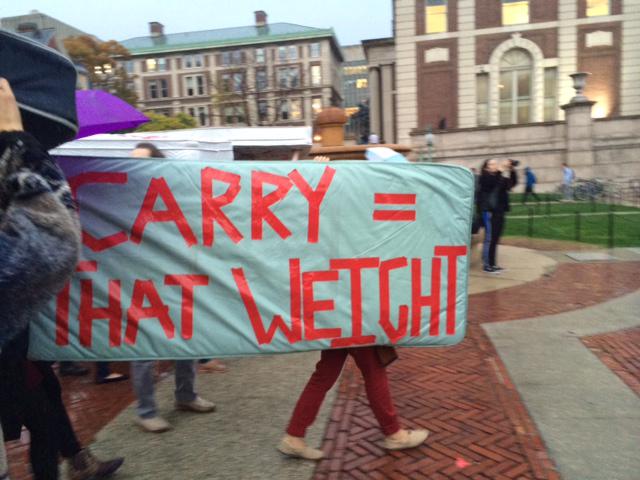This year, Columbia University student Emma Sulkowicz became an emblem for how colleges mistreat victims of sexual assault on campus. After Sulkowicz reported an alleged rape to the Columbia administration and the college found the accused not responsible, she began hauling her 50-pound dorm mattress across campus as a powerful symbol of an adjudication system she claims is confounding, ineffectual, and unfair. The act has grown into Sulkowicz’s undergraduate art thesis project and inspired a national movement, Carry That Weight, that advocates on behalf of campus sexual assault survivors. In the shadow of her campaign stands Paul Nungesser, the student Sulkowicz says raped her. Today, the New York Times published the first interview with Nungesser himself. It’s the most intimate, high-profile portrait so far of a college student who was accused of rape—one who says that the system has failed him, too.
In his time at Columbia, three female students have accused Nungesser of sexual misconduct. He’s denied each accusation, and has not been formally disciplined by the university. When one student accused Nungesser of groping her at a party, the university initially decided against him, but he successfully appealed the ruling. After another student accused him of intimate partner violence, the university dropped the case when the alleged victim stopped cooperating with the investigation. And when Sulkowicz accused Nungesser of raping her, Columbia declined to find him responsible, citing lack of evidence.
In lieu of any formal finding, Nungesser had paid a social cost. “He has gotten used to former friends crossing the street to avoid him,” Ariel Kaminer reports in the Times. “He has even gotten used to being denounced as a rapist on fliers and in a rally in the university’s quadrangle. … His name has been plastered on campus bathrooms and published in easily searchable articles. His face is visible online, too, in photos that detractors have posted as warnings to strangers.” Because Columbia failed to discipline Nungesser, Columbia bloggers, activists, and supporters have stepped in to exact their own punishment, and national media has fanned the flames.
It’s hard not to feel sympathy for Nungesser here, even as the opinions he airs on intimate partner violence—“Outside of a forced marriage or kidnapping, it just seems very hard to believe that a person would over and over again put themselves in a situation where they could expect this kind of behavior to occur”—are odious. In a perfect world, Nungesser would never feel compelled to pontificate on that particular issue in the Times. As Sulkowitz has emerged as a symbol of disenfranchised survivors, Nungesser has come to symbolize all the entitled young men who take what they want and never pay the consequences. That’s not quite fair. No matter what actually happened in Nungesser’s three cases, campus rape is a systemic problem, and he’s just one man. Forcing Nungesser to pay personal consequences for the broken system is not going to fix it. Sulkowicz’s mother, Sandra Leong, rightly (and very generously and humanely) frames Nungesser’s experience as an unfortunate byproduct of the university’s failure to appropriately adjudicate sexual assault cases. “I think by sweeping it under the rug [Columbia has] subjected him to a very painful, scarring experience,” she told the Times. “I don’t see it as Emma’s fault because she just had to do what she had to do but I do see it as the school’s fault.”
When outlets report on campus sexual assault, they tend to carefully segregate the experiences of students like Sulkowicz and Nungesser into separate stories: The system fails victims; the system fails the accused. But it’s the same system, and right now it doesn’t look like it’s serving anybody. We don’t need to pick sides to come to the conclusion that it needs to be refomed. Perhaps the stories we’re hearing from students like Sulkowicz and Nungesser are evidence of growing pains as the campus adjudication process evolves into a responsible and workable system for everyone involved, or maybe they’re warning signs that colleges will never be able to adequately address this issue. Either way, there are no easy lessons here, just a group of people who are looking for justice and not finding it on campus or anywhere else.
